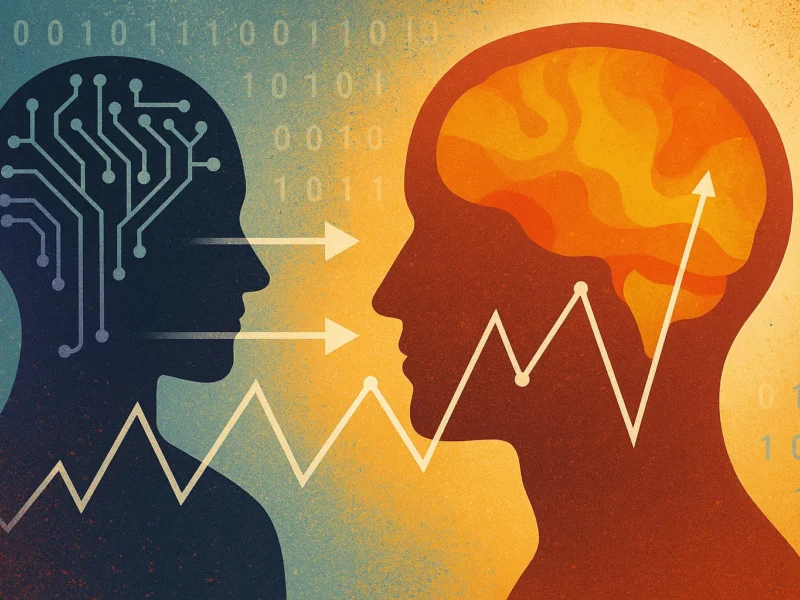Every day, we decide... or think we do it?
We take in hand the smartphone. Choose an app of streaming, and there are “recommended for you”. A click and we are already looking. Then a notification suggests where to eat another system that offers us the best path. Every day, we make hundreds of decisions. But how many of these are truly our own?
We live in a world in which predictive technologies anticipate our moves even before that we are aware of it. The illusion of free choice it's powered by the interfaces that guide us gently, but firmly, to expected behaviour. And if artificial intelligence could predict with good accuracy not only what we like, but also what we will do tomorrow, how would the concept of agency?
What are predictive technologies and how they work
With “technology predictor” refers to systems capable of analyze past data and generate predictions about future events. These systems are based on algorithms and statistical models of machine learning and neural networks that are trained on enormous amounts of information. The analyzed data can be explicit, such as stated preference, or implicit, such as behaviors, histories, movements, and interactions.
The goal is not only to predict, but influence the probability. If the algorithm knows that a person has bought a certain product, can suggest one related. If you recognize a trend in the emotional language used online, it can deliver content more relevant to that mental state.
This logic is the basis of personalized marketing, but also the selection of personnel, of the justice for predictive medicine algorithmic. More data, more accuracy. More accuracy, less space for the unpredictable.
Artificial intelligence and free will
In the context of artificial intelligence, the concept of agency enter a crisis. If our choices are influenced by stimuli that are designed on the basis of predictive models, how much are we really free? When we choose something that is suggested by the algorithm, we are deciding or are we following a track?
A concrete example is the use of predictive algorithms in the world of work. As described in the article "Work 4.0: AI and the Professional Revolution"many automated systems to select the candidates based on the scores calculated on a CV, keywords, previous behaviors. The candidate does not know to be excluded by an algorithm. The company doesn't really know why that algorithm has made that choice. Yet the decision is made.
In the social media algorithms that push us towards certain content, and it is often difficult to distinguish between what you really want from what we were simply presented with insistence. We have discussed this in “The AI and Social Media: The Invisible Power of Algorithms”, where we highlight how the design of the platforms will be built to guide the user, that provide real-world alternatives.
Practical implications and cultural
When an algorithm provides a behavior to anticipate him, creates a form of effect reflective. Knowing that we will be pushed in a certain direction, it is difficult to resist. The tip is indistinguishable from the will. And in a society that is increasingly data-driven, micro-decisions daily end to plot the trajectories that seem to have been chosen to be free, but are the result of the statistical optimization.
A study published on Nature Communications he highlighted predictions that the algorithms of human behavior can reach an accuracy of amazing already with a handful of data. Our unpredictability, a time considered to be an essential part of human freedom, is now reduced to patterns that can be analysed. This raises profound questions on the concept of free will in the age of artificial intelligence.
In addition, the The Brookings Institution he discussed the challenges of equity in the decisions the algorithmic, emphasizing the importance of defining and mitigating the bias to ensure the right decisions and transparent. These insights highlight the need for a critical reflection on the use of technologies, predictive, and their impact on our decision-making skills.
And yet, as we pointed out “The AI and Psychology: Understanding the Human Mind with the Algorithms”, the artificial intelligence is a mirror powerful. It reflects what we are, but it does not define what we can become. And this is the central node of the reflection on the agency.
Frequently asked questions (FAQ)
Predictive technologies, take away our agency?
Not eliminate, but reduce it. Act on our attention, on the probabilities, on the quick decisions. The freedom is, but it is more difficult to exercise.
You can avoid the influence of the algorithms?
Only in part. Awareness is key. Knowing how these systems helps to maintain an active, not passive.
The AI can predict really the future?
No. Can only make estimates statistics based on the past. But if we all follow what the algorithm provides, then that provision can become a reality.
We should limit the use of?
Yes, especially in contexts of high social impact: justice, education, health, democracy. Serves to regulate, but also digital literacy.
Regain the freedom of choice
We can no longer speak of freedom, it will not include the size algorithms. Every day we live with the predictions that try to tell us. It is not always a bad thing. It is sometimes convenient, useful, even reassuring. But we must learn to recognize when a choice is truly ourand when is a shortcut designed to reduce the uncertainty.
Predictive technologies, they put us at a crossroads of culture. We can become passive users, who let themselves be guided by what is optimized, or we can cultivate a new awareness that helps us to exercise free will even in the age of data.
The AI knows us, but may not know until the end. And in that gap, a tiny but essential, to play our freedom.
